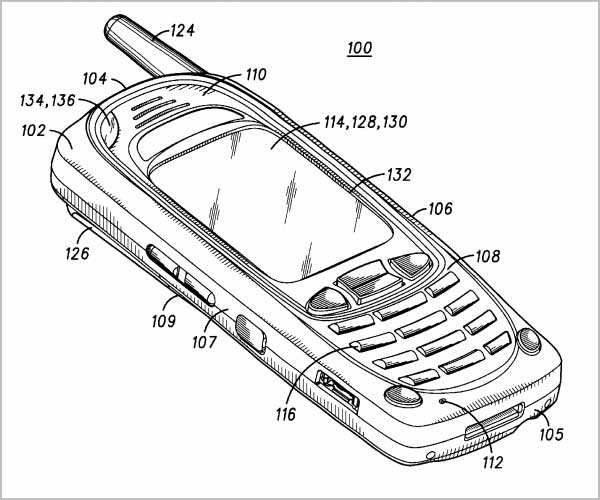Google cites quote from Steve Jobs biography in attempt to win iPhone import ban
Illustration from Motorola's '862 patent showing a hidden IR proximity sensor (134, 136) located near the speaker.

In its attempts to garner an iPhone import ban from the U.S. ITC, Google continues to assert the viability of a Motorola utility patent regarding proximity sensors despite having the argument denied twice by an administrative law judge.
As noted by FOSS Patents, Google's latest attempt to salvage the patent, and with it an attempt to win an import ban against Apple's iPhone, came in a public redacted version of the company's opening brief filed with the ITC, which looks to narrow claims to prove the property valid. More specifically, Google is looking to validate Motorola's U.S. Patent No. 6,246,862 relating to an infrared proximity sensor system that detects when a user brings a handset up to their ear, which in turn disables screen input to avoid errant touches.
The internet search giant is asserting primary considerations to the Commission that the property in question is of a "non-obvious" nature, as well as secondary considerations relating to the patent's usefulness.
In April, Judge Thomas Pender found that Apple violated Motorola wireless technology patents, but deemed the IR property invalid due to indefiniteness. Following a review of the ALJ's decision, the Commission reversed the indefiniteness finding and sent the case back to Judge Pender. After looking at the patent for a second time, the jurist issues a remand initial determination in December, once again finding the Motorola patent invalid for "lack of novelty." Following the decision, the six-member head of the ITC announced in February that it would once again be reviewing the ALJ's findings.
In its filing, the Mountain View company also pointed to a quote from late Apple cofounder Steve Jobs, as seen in the tech guru's biography written by Walter Isaacson:
Here, the technology of the '862 patent was recognized as a 'breakthrough' by none other than Apple's former CEO (Mr. Steve Jobs). On cross examination, Apple's expert, Mr. Lanning, could not deny that Mr. Jobs himself characterized the incorporation of a proximity sensor into the iPhone as a 'breakthrough' to his biographer, Walter Isaacson: '[a]nother breakthrough was the sensor that figured out when you put the phone to your ear, so that your lobes didn't accidentally activate some function.' [...] The sensor described by Mr. Jobs is the very technology that the ALJ found to infringe. [...] And there can be no doubt that this passage refers to the technology of the '862 patent: it describes a sensor that prevents the inadvertent actuation of the phone when it is put to the user's ear. The recognition that the invention of the '862 patent was a 'breakthrough' weighs heavily against a finding of obviousness, particularly since it came from Apple itself.
According to the quote, Jobs showed interest in the feature which allowed a smartphone to determine when it was close to a user's ear, however Motorola's patent mentions basic infrared technology that it did not invent, possibly weakening the Google-owned telecom's case.
 Mikey Campbell
Mikey Campbell










 Mike Wuerthele
Mike Wuerthele

 Malcolm Owen
Malcolm Owen
 Chip Loder
Chip Loder

 William Gallagher
William Gallagher
 Christine McKee
Christine McKee
 Michael Stroup
Michael Stroup







47 Comments
I can't wait for the spin doctors to come running from the Samsung thread to this one¡
Didn't Apple buy a proximity sensor that was offered by another mfg? If so, then Google needs to talk to this component mfg instead of Apple. Google's reaching on this one.
Unleash hell, Apple!
If one judge denies quotes from the bio, shouldn't that be denied on all cases against Apple? Or can one judge do one thing and another judge do another? Besides, that phone doesn't look like a touchscreen rather the IR on this phone would simply turn the screen off to save power. But I didn't read the patent, so I could be wrong, obviously.
So much for Google not using patents aggressively.